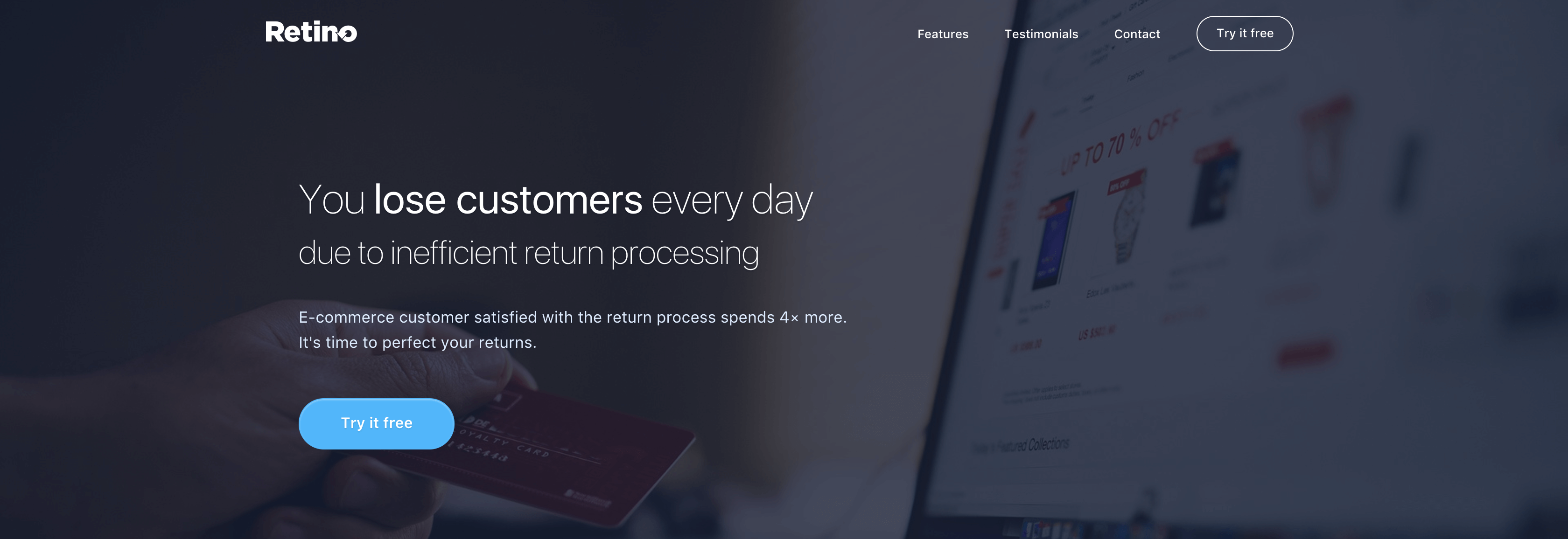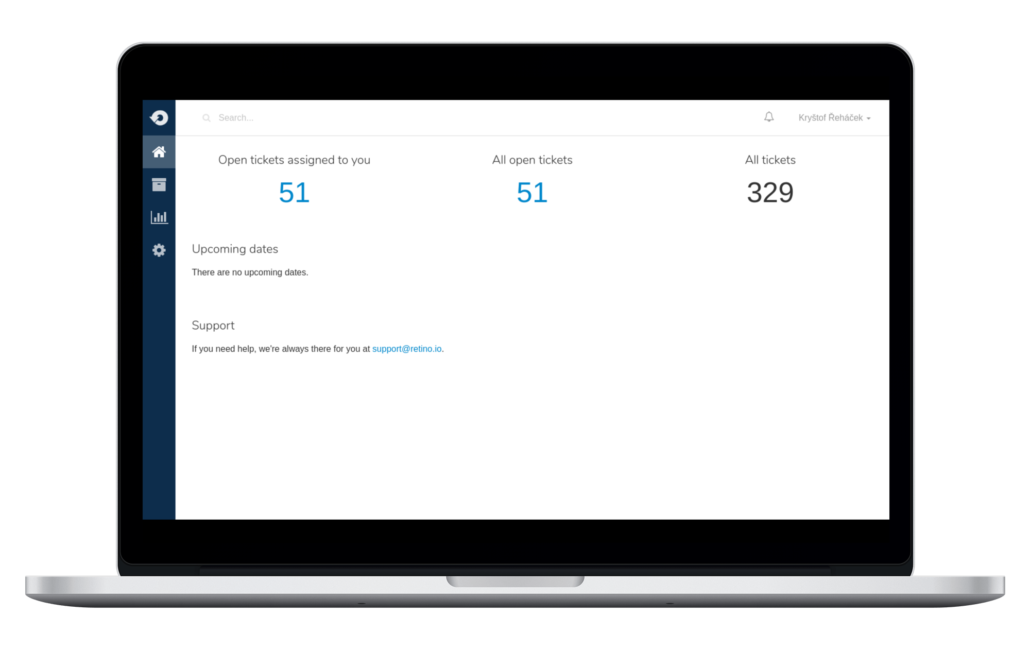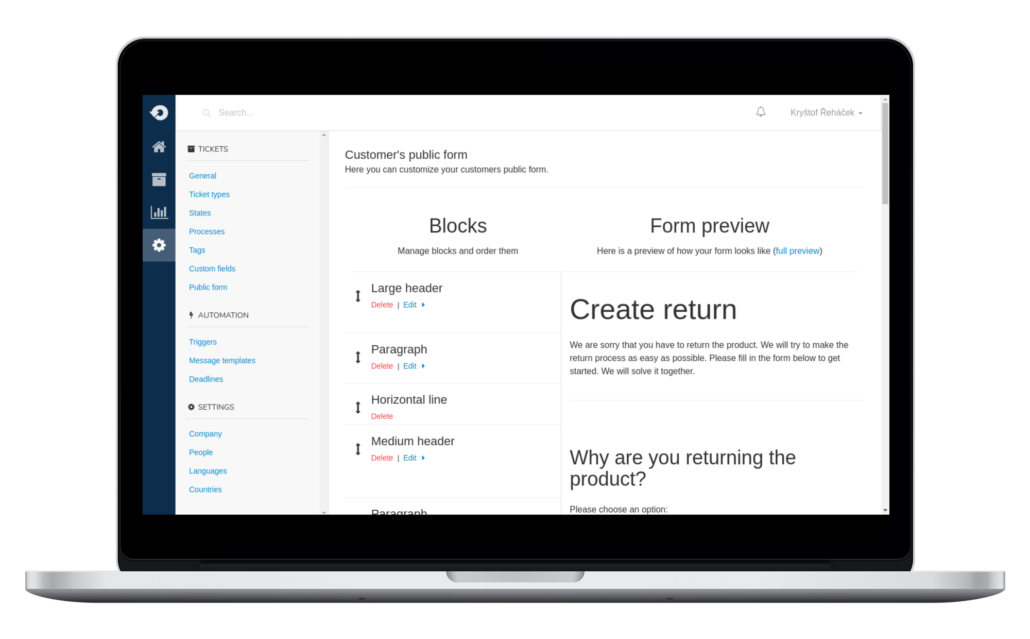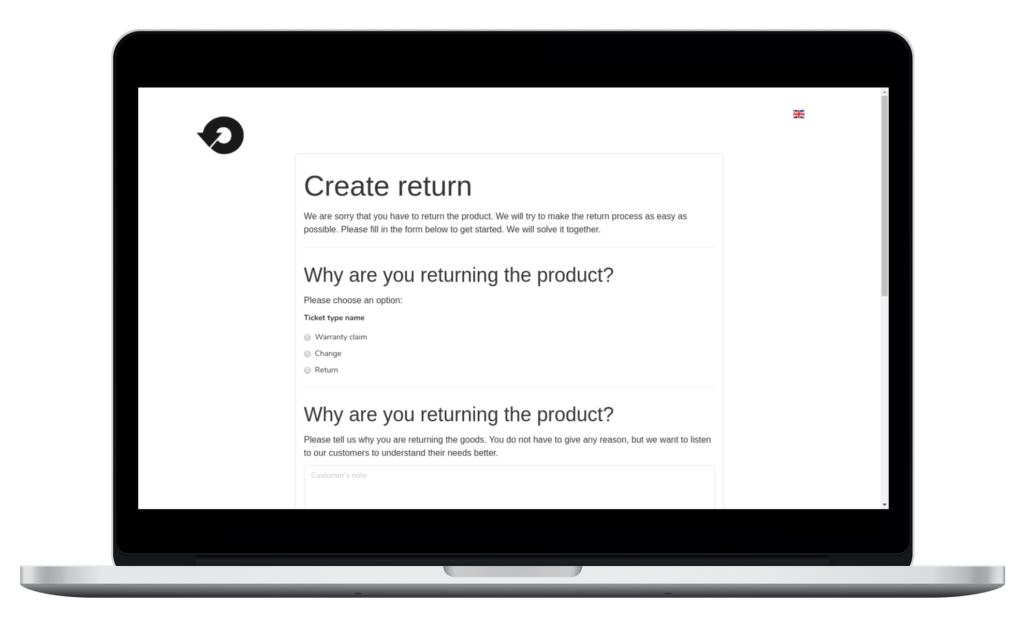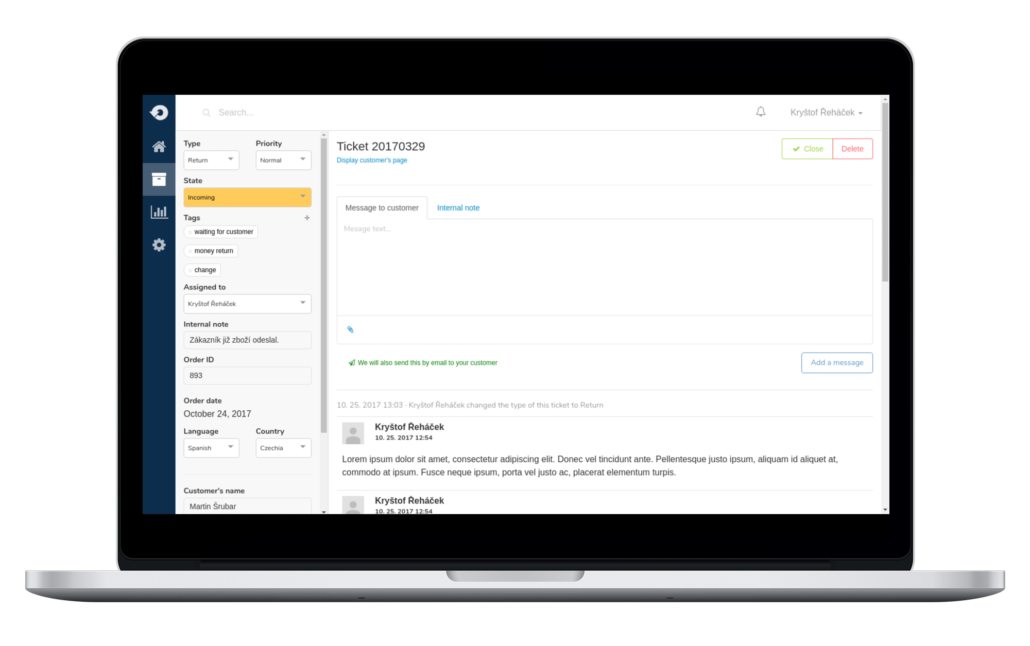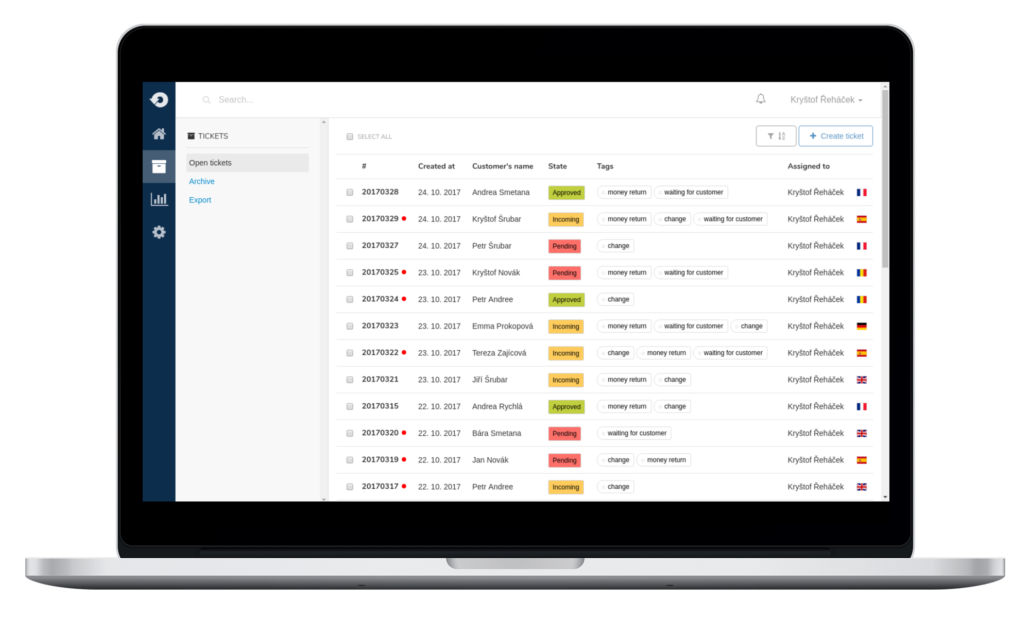StartupYard Presents Retino: Making Returns Great Again
Retino, another of the Czech teams in StartupYard Batch 8, is changing the game for e-commerce customer service in Europe, and maybe elsewhere as well. Retino is a fully functional “reverse logistics” platform, that can integrate seamlessly with existing e-commerce platform software to make returns management a breeze, rather than a headache.
In the past, returns were a personalized experience. You took the goods back to the shop, and got your money back (or something in exchange). But today, with more shopping than ever occurring online, returns experiences are only getting harder to manage.
Why are returns so hard in e-commerce? Because each return has the potential to be unique, and require special attention. Moreover, a return process that works can significantly improve brand image for an e-shop, while a bad returns experience can spoil a customer relationship forever. Enter Petr Boros, Founder and CEO at Retino, the Czech tech company making returns great once again.
I sat down with Petr recently to discuss his journey to founding Retino, and why returns are a looming problem for e-commerce players here and across the world.
Hi Petr, how did you get the idea for Retino? Was it based on your previous experience in building a successful e-commerce company?
It happened in February earlier this year. I was still running the e-shop we had built with my partner Daniel Kšíkal, but we were already in the process of selling the company at the time, so I knew that I would be free in a couple of months and hungry to start another company.
I didn’t want to stop challenging myself in business.
Building software for e-commerce sounded good to me. I wanted to do something related to e-commerce, because I had experience in the field. I also I wanted to go more technical, because I was trained in computer science and, technology is where my heart is.
The original idea for Retino is actually not mine. I remember we were having lunch with my friend Peter Hajduček, CEO of Footshop, one of the fastest growing e-commerce companies in the region. We were discussing many business ideas and one of them was solving low customer satisfaction in returns and claims.
So that was the initial spark. Then I thought about it for about 3 more months until we sold our previous company. After the exit, I jumped right into Retino: market research, talking with prospective customers, developing the platform, hiring people, and applying to StartupYard…
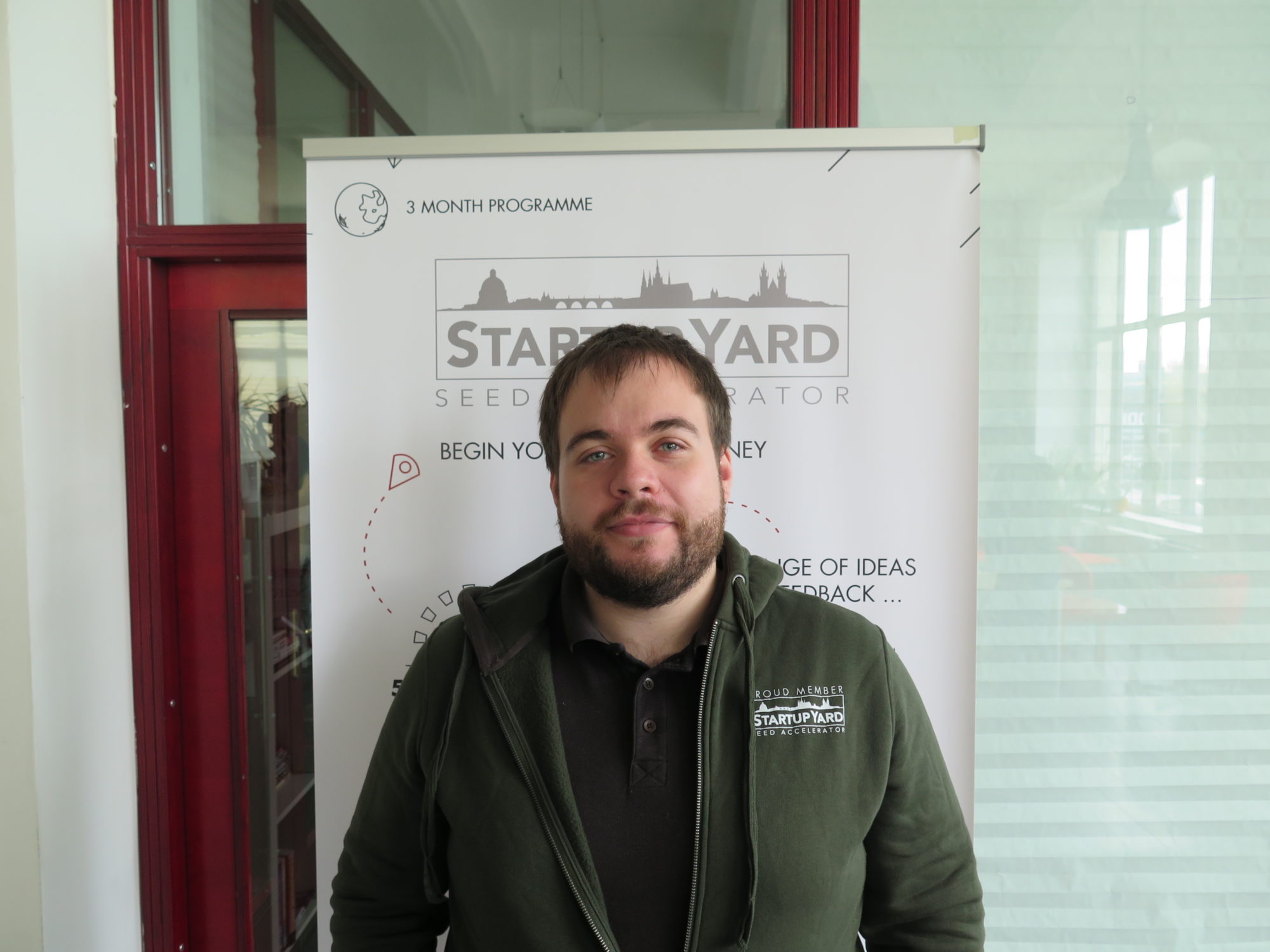
Why are returns and reverse-logistics becoming an even bigger problem today than they were a few years ago?
There are two drivers. First, e-commerce grows by double digits every year. Five years ago, the total revenue of Czech e-commerce was about 40 billion CZK. This year, we are well over 100 billion CZK (€4 billion). So the magnitude of the problem is bigger simply because the market is bigger.
Second, return rates inside e-commerce grow by double digits as well. Five years ago, customers were not returning as much. If you ordered a hoodie and it was too small for you, you would probably just give it to your brother. That’s not the case today. Customers feel much more entitled to great service, and the right to return things that aren’t perfect.
For instance, after the emergence of ZOOT, more and more online shoppers are accepting returning as a new standard. The Czech market is an interesting case, because Amazon and big-box e-commerce players have not really penetrated as much. Our market is smaller, but these brands have still educated the market about the ideal customer experience, and people expect the same level of service as others enjoy in the U.S. or Germany.
Many e-shops don’t think about returns as a problem. But what effect does a bad return policy and system have on a retailer?
I know this from my own experience. When you run an online shop, you focus 100% on the “forward.” That is, getting the people on your website, having them purchase your products, and delivering the goods to them.
In the beginning, this makes sense. The problem is that you will not be able to acquire more and more customers with reasonable cost. Particularly if you are regionally limited. You have to retain your customers.
Making returns is a critical spot in the customer journey. Not every customer reaches this point, but when they do, it matters very much how you solve their problem. The rules of retail still apply as they always have.
A customer satisfied with the return process will spend 4x as much in the next two years at your shop. This information alone should convince the e-shops to rethink their returns.
But there’s more. For example, did you know that 66% of customers check the return policy before placing the order? Yet, the majority of e-shops still “hide” the policy and word it in legal gibberish. These e-shops are pushing their customers out the door by refusing to give them vital information. Once again, trust matters more when anyone can run an e-shop.
Also important to consider is that 5 years ago, Facebook and other social media penetration was nowhere near what it is today. Now almost half of the Czech population uses Facebook alone – and almost one third of the whole planet does. That gives customers a lot more leverage over online retailers than they had before, because bad news (or a bad review) travels fast.
Are there some examples of companies that have tackled the returns problem in a creative way?
Research shows that 60% of customers keep unwanted products because returns are too hard. At first sight, this might seem like a good news for e-shops, because they don’t have to process them and offer the refunds. But guess what? That customer who failed to return the product will likely never make another purchase on that same shop again. It doesn’t even matter if it isn’t the e-shop’s fault. The experience just sours the relationship.
I was talking with a director of another large fashion store recently, and he told me that their return rates doubled shortly after ZOOT came to the market with a great returns process. Think of that – this is how fast the customer landscape can shift. What ZOOT did was to introduce a mix of online/offline retail that suited their customers much better.
They started by providing pickup points for their products, where the customer could also quickly return a product if it didn’t fit. That made shipping faster, and returns much easier, because customers never had to deal with the post at all. More work for the company, but much less hassle for the consumer.
The guy I mentioned was very angry about this. My experience is that being angry is not the winning approach. The paradigm is shifting. You have to offer a super-nice return process (so that you acquire and retain customers) and you have to be able to process the returns with a very low overhead (so that you actually make some money).
If you have the capacity to do this yourself, go ahead. If not, go Retino!
So for you, this is more about the mentality the e-shops have, and not the technology they’re using?
The technology follows the mentality. If you haven’t built a good return system, it’s because you aren’t focused on it. If you don’t invest in your returns process, it will be a mess. If it is a mess, it is because you don’t care if it works or not. It all goes back to the mentality.
I’ll share a personal story with you: About 10 years ago, my family ordered a new computer from CZC, which as you may know was one of the early Czech e-commerce platforms, founded by Josef Matějka.
In that time, it was still more common to buy electronics from a local retailer, not e-shops, so this was a kind of a big deal. Anyway, something went wrong on their side, and they were unable to deliver the computer on the date they promised. That was a problem as we were leaving for abroad and would not be back for some time.
I bet this sounds like a familiar story to a lot of people. But the amazing part is what happened next. We called and told them the situation. Somebody from CZC, and I am not sure, but it could have been Matějka himself, drove over 400km to deliver that computer in person. I personally met them and got the computer at about 10pm that same day.
You see, this happened over 10 years ago and I still remember it. Back then, I told everyone what happened, and CZC was for a long time my first choice when buying electronics.
That says so much about who Matějka is, and about the company he was trying to build, that they would go so far to fix a mistake they made. It might not even have been their own fault, but they took our needs very seriously. They took responsibility for keeping their promises.
Obviously I can’t be the only person who had such a good experience with them, so their success over the years has never surprised me. That customer-first thinking is a principle that any business can adopt today, without changes in technology. Technology only helps us to do this, but it does not change our mentality.
Today you’re focusing on the local e-commerce market. What will be Retino’s focus for the future? WIll you explore different business models, or expand geographically?
Both. There are so many things to do in returns, but we have to prioritize. Right now we are focusing our salesforce on the Czech and Slovak markets.
That does not mean that we cover only the Czech and Slovak market. One of our pilots operates in 13 markets and we have to be able to run the return process in all of them, so we are very well technically prepared for the expansion. It’s just that our salesforce is limited for now, and there’s still much to do in the local market.
We have international ambitions, and I think our model can work very well in all EU countries. This is especially true when you consider the new GDPR regulations on privacy and data in Europe. You’ll just have to trust me on this: few e-commerce platforms are fully compliant yet, and they will struggle to be compliant if they don’t adopt new software like Retino, which is fully compliant.
We also have put a lot of thought into vertical scalability, and we have come with different business models and revenue streams. Some of them are for an even larger business than what we are doing at this moment. You’ll see…
A look at Retino’s Simple Returns Management Platform:
What would you say are the top 2-3 mistakes that most e-commerce companies make when it comes to their returns process and policies? How can they improve today?
An unhappy customer turned happy is more valuable than just a happy customer. We see large corporates in banking or telcos actually deliberately “doing a little wrong” to their customers so that later they can fix them and gain more loyalty. Consumers see apologies and mea-culpas as a humanizing thing, and they do appreciate a brand that is not afraid to be human, admit some mistakes and offer compensation.
I’m not telling you to do this intentionally, but the principle holds. If you have an e-shop, every time you see a customer unhappy with your product, try to convert him back. If the customer is nice, do whatever you can to achieve this, and don’t worry about how much it costs you. It will cost more not to do it.
I would say that this mindset shift has to occur before anything else, but if you want a couple of “quick fixes”, consider this:
1. A return policy should be clearly visible and not hidden in your general terms and conditions. The best shops actually show their policy on the product detail page next to price and delivery date.
2. When you physically get the goods back, always notify the customer that you received them. We see many shops not doing this, although it’s very important for the customer.
3. Never delegate your responsibility to your dealer or manufacturer. That is incredibly frustrating and trust-killing for customers. It is you who agreed with your customer and it is your reputation on the line. Take charge of it.
What kinds of early customers are you looking for, and how can they start working with Retino?
We are looking for customers who want to do their returns and claims right, and we’ll be happy to help them with that. More than that, we want customers who are seeking to differentiate themselves in terms of great service.
Our ideal customers understand intuitively that this is the way they should approach returns, but they don’t have the time or resources to do it themselves. Their current system may be a mess, or just not very efficient, but they are ready to do better. Retino represents thousands of man-hours of work and a lot of thought and care. To replicate it, much less maintain it, would cost an e-shop a lot of resources on an ongoing basis.
Our solution stack makes sense for most shops processing 20-2000 monthly returns. Integrating Retino is easy and can be done in one day, no developer needed in the process. With the largest shops, we also work on custom integrations to fully unleash the potential of our automation service.
We ship new features every week or so and all our customers benefit from that with no extra cost. This is a problem best solved by specialists.
The best way how to start with us is to fill our demo request form at www.retino.io or simply drop us a line at sales@retino.io. We’ll get in touch with you, discuss your process and issues, see if we can help and set up a demo.
Tell us a bit about your experience with StartupYard so far. What have been the biggest surprises, or challenges you’ve faced since you started?
The StartupYard team is composed of excellent people who know what they’re doing. They also see personal fit as important measure. So, even though the acceleration program is very demanding, it is a happy place to work at and we are basically one large family.
I knew that StartupYard’s network of mentors is extensive (and it was the main reason why I applied for the program), but it actually exceeded my expectations. There is virtually everyone relevant for any business in this region in the +1 network of StartupYard’s mentors.
I found the mentoring sessions very important, because 1. mentors asked me questions that I didn’t really want to hear, but they were super important for steering the business in the right direction, and 2. we got a lot of good leads for our business that we would have hard time getting otherwise at this stage.
I’m thankful for Retino being invited to StartupYard and I’m happy to work with the StartupYard team every day. If you have a strong team and a solid idea, I would very much recommend you applying for StartupYard.
Most importantly, I would like to thank my team – Karolína, Kryštof, Vojta and Radim – for bearing with me during the program. Acceleration is tough and time-consuming, but they all proved to be very self-sufficient. Even though I was not always available, they worked hard to push our story further every day. I’m very grateful for having such an awesome team. Thank you!
Retino and the Other Batch 8 Startups will Pitch at StartupYard’s DemoDay: November 22, in Prague



